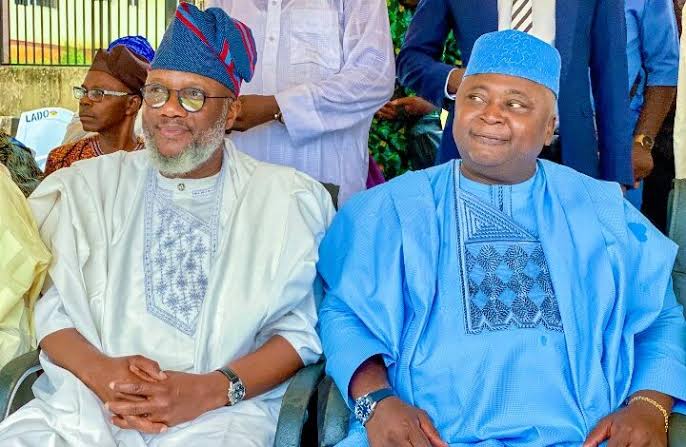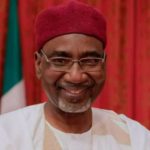...To get all news updates, Join our WhatsApp Group (Click Here)
Also Join our WhatsApp Channel (Click Here)
– The Unholy Alliance That Would Have Plunged Ogun into an Abyss”
– The Mirage of Ideology: A Power Grab Disguised as Leadership
In the grand theater of Nigerian politics, alliances are often forged not out of shared ideals but out of expedience. The coalition between Ladi Adebutu and Adekunle Akinlade was a classic case of such convenience—a marriage of strange bedfellows united only by their lust for power.
As the dust of the 2023 election settled, it became glaringly evident that their partnership was devoid of any genuine ideological foundation. Akinlade’s recent outburst, declaring that Ogun State was spared a calamity by Adebutu’s defeat, underscores the hollow nature of their alliance. It is an indictment not just of Adebutu’s leadership but of the entire campaign—a campaign that was more about seizing power than serving the people
The Illusion of Unity: When Convenience Breeds Contempt
Beneath the glittering facade of political ambition often lies a festering rot—a decay of principles, honour, and integrity. This grim reality has been laid bare in the aftermath of Ogun State’s 2023 gubernatorial race, where the once allied forces of Adebutu and Akinlade unraveled in a spectacle of mutual disdain.
Akinlade, the erstwhile deputy governorship candidate under the banner of the People’s Democratic Party (PDP), has unleashed a scathing tirade against his former running mate, Adebutu, painting a picture of a disaster narrowly averted. Had Adebutu triumphed in the election, Akinlade argues, it would have heralded a season of despair for Ogun State—a sentiment that speaks volumes about the crumbling alliance that was, perhaps, doomed from the start.
A House Divided
Akinlade’s condemnation of Adebutu goes beyond mere political rhetoric; it reveals deep-seated animosity and a fundamental lack of trust that had simmered beneath the surface of their public alliance. His comparison of Adebutu to a child trapped in a man’s body—a leader bereft of the mental fortitude and maturity required for governance—lays bare the fractures that have long existed between them. This characterization is more than just an insult; it is a stark admission that their union was never truly cohesive, never truly built on a shared vision for Ogun State. Akinlade’s remarks are not just the sour grapes of a defeated politician—they are the bitter truths of a man who now feels unshackled by the chains of a failed alliance.
The Mirage of Ideology: A Power Grab Disguised as Leadership
What emerges from Akinlade’s diatribe is the revelation that their campaign was a mirage—an illusion of unity masking a void of ideology. In the absence of a coherent philosophy or vision, their joint ticket was nothing more than a vehicle for personal ambition. Akinlade’s declaration that Adebutu’s victory would have spelled disaster for Ogun State is a damning critique of their shared enterprise. It exposes their campaign as one driven by a hunger for power, rather than a genuine desire to uplift the state. The partnership was not rooted in a commitment to the people of Ogun but in a selfish pursuit of political dominance—a pursuit that, had it succeeded, would have left the state in ruins.
The Specter of Calamity: What Might Have Been
Akinlade’s imagery of divine intervention, with an imam’s prayer as the fulcrum that tipped the scales away from an impending disaster, is as poetic as it is ominous. The suggestion that Ogun State narrowly avoided a period of sorrow and backwardness paints a chilling picture of what could have been. It is a stark warning to the electorate of the dangers of electing leaders whose ambitions are not grounded in a sincere commitment to governance. Akinlade’s words serve as a cautionary tale—a reminder that the consequences of such ill-fated alliances can be catastrophic, not just for the politicians involved, but for the entire state they seek to govern.
A Prelude to Disaster: The Incompetence That Never Was
In his scathing assessment, Akinlade portrays Adebutu as a man wholly unfit for the rigors of leadership. His accusation that Adebutu’s father still provides him with a weekly allowance is a metaphorical dagger, cutting to the core of his former running mate’s credibility. This image of a man-child, incapable of managing his own affairs, let alone the complex machinery of state governance, is a brutal takedown of Adebutu’s persona. It suggests that Ogun State was saved not just from poor leadership, but from a catastrophe of incompetence that would have set the state back by years. The notion that Adebutu, despite his advanced age, lacks the maturity and judgment necessary for governance is a potent indictment, one that raises serious questions about the decision-making processes that led to his candidacy in the first place.
The Aftermath: End of a Fraught Alliance
As the political landscape of Ogun State continues to shift in the wake of the 2023 elections, the fallout between Adebutu and Akinlade serves as a sobering reminder of the dangers inherent in political alliances born out of expediency rather than conviction. Akinlade’s blistering critique of his former ally is not just an attack on Adebutu, but on the very nature of their campaign. It is a repudiation of the opportunism that drove their bid for power, and a stark warning to those who would seek to govern without a clear and principled vision.
Subheading: A Cautionary Tale: Lessons for the Electorate
In the final analysis, the saga of Adebutu and Akinlade is a cautionary tale for the electorate—a reminder that not all that glitters is gold. The allure of charismatic leadership and grand promises can often mask deeper flaws—flaws that, if left unchecked, can lead to disastrous consequences. Akinlade’s revelations should serve as a wake-up call to the people of Ogun State and beyond: to look beyond the surface, to question the motivations of those who seek their vote, and to demand leaders who are not just ambitious, but principled and committed to the common good.
The Path Not Taken: A Glimpse into a Dark, Alternative Future
As Ogun State moves forward under the leadership of Governor Dapo Abiodun, Akinlade’s words hang in the air like a specter—a glimpse into a dark alternative future that, by his account, the state narrowly escaped. The story of Adebutu and Akinlade is not just a tale of political betrayal, but a profound lesson in the perils of leadership unmoored from principle. It is a reminder that in the world of politics, as in life, the choices we make—and the alliances we form—can have far-reaching consequences. And sometimes, as Akinlade so vividly illustrates, the most important victories are the disasters we manage to avoid.
Source: The Capital
You can get every of our news as soon as they drop on WhatsApp ...To get all news updates, Join our WhatsApp Group (Click Here)
Also Join our WhatsApp Channel (Click Here)

















